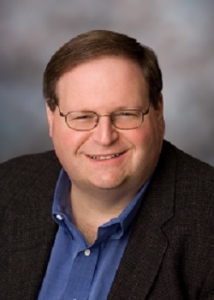By Gregory Pings
His home is in a walkable, bikeable central neighborhood in Portland, Oregon. Chris Smith began telecommuting part time in 2000 in order to save the 20-minute drive (on a good day) to suburban Wilsonville. His telecommute grew to full time, and he finally gave up his cubicle in Wilsonville a few months ago.

“Social events with colleagues are really the only reason to go the office,” Smith pointed out.
The site architect for Xerox.com, Smith manages a small team that runs the technology behind Xerox’ web marketing properties. The team sets standards for technology, and provides services for each of Xerox’s branded web sites in more than 160 countries around the world.
Most of Smith’s meetings are conference calls across multiple time zones. His team — employees, contractors, colleagues and stakeholders – are in Wilsonville, the U.S. east coast and the United Kingdom.
“At times I’ve contracted with agency teams in Eastern Europe or Latin America,” he noted. “It makes absolutely no difference where I’m sitting when I take those calls.”
On top of this, Smith serves as vice chair for Portland’s Planning and Sustainability Commission. He’s worked on “The Portland Plan,” an overall strategic plan for the City, as well as their Climate Action Plan, Comprehensive Plan, Transportation System Plan, and more specific issues that range from inclusionary housing to bicycle parking. This work frequently involves meeting with folks in the community outside of commission meetings.
“My idea of work-life balance has morphed into work-life ‘blend.’ My Xerox, Planning Commission and personal responsibilities are all in the mix, more or less all the time,” he said.
How do you set the page free?
Tweet us using #SetThePageFree, or share your thoughts in the comments below.
Discipline, priorities and flexibility
Smith’s blended approach provides a lot of flexibility, so prioritization and time management are critical. “It could all get overwhelming without good discipline,” he explained
Sometimes he can’t attend a community meeting that he’d like to, but he says Portland has more meetings than he could attend anyway. Formal meetings of the commissions and boards he serves on get priority, however.
Smith’s typical day looks like this:
- Get up between 5 and 5:30 a.m., clear his overnight e-mail and sometimes takes a conference call from Europe.
- Afterwards, an 8- to 10-mile bike ride, stopping for breakfast along the way.
- Back between 8 and 9 o’clock for the first of his scheduled conference calls.
- The Xerox day winds down at 2 p.m. as folks on the east coast go home.
- Now begin the meetings related his community work, some of which are face-to-face.
- In the evenings, he’s often at home working on code projects that need focus without interruption from meetings.
But it’s not always that clean. For instance, his Xerox calendar is blocked out for the Streetcar Board that meets on Wednesday mornings. Smith avoids double-booked meetings with some cobbled-together tools that sync his Xerox calendar in Outlook with his personal Google Calendar.
His days are knit together with meetings, phone calls and coding sessions, but Smith says he needs only three things to do his job:
- Great teams: People who are very expert at what they do.
- Internet: He has at least three ways to stay connected.
- Communication Tools: Email, WebEx and Slack keep him in touch with teammates and stakeholders across 11 time zones. (“Sometimes,” Smith noted wryly, “my life feels like one long conference call.”)
His home office maximizes productivity. A sit-stand desk holds three screens: One is logged in behind the Xerox firewall and has a webcam for conference calls. Another screen is connected to Xerox properties hosted in the cloud, and the third is for media.
“It’s very productive,” Smith explained. “I use the ‘outside the firewall’ screen for my planning commission work.”
Technology pulls everything together
“I live in a web browser,” Smith said. “My preference is Chrome, with a wide range of development tools, but I also use Microsoft Edge because our customers are generally split between Chrome and Microsoft browsers. I also rely on a variety of code development and collaboration tools.”
While on conference calls, he multi-tasks. A lot. His iPad Mini is essential when he’s on the move. It allows him to deal with the occasional Xerox issue while in a planning commission meeting – or while stopping for breakfast on his morning ride. Back at home, Microsoft Garage’s experimental Mouse Without Borders lets him share one keyboard and mouse between his two main computers.
For Smith, “setting the page free” begins with tools that allow him to meet with teammates and partners from around the globe, exchange information and ideas immediately, and execute complex code. None of this is tied to an office or even a particular machine. One result of Smith’s “page set free” is staring at you right now. This blog could not exist without his team’s attention to our widgets, updates, and patient answers to our questions about this and that.
If you think that’s impressive, go to Xerox.com and consider the tools, technology and people who make it possible to tell you what you need to know about our products and services or engage with our experts. And you’re able to interact with our site across the globe – in local languages.
“Everything gets done,” Smith observed, “but it takes focus on priorities and outcomes to make sure nothing critical gets dropped.”
(The Set the Page Free in the Modern Workplace summer series will be published each Friday on Xerox Connect. Subscribe to this blog so you won’t miss a thing.)



